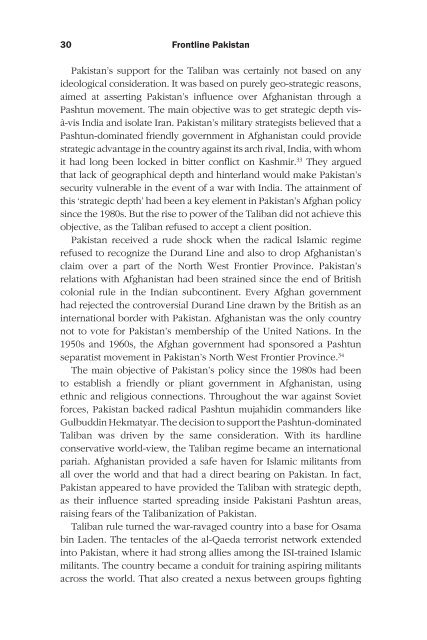Frontline Pakistan : The Struggle With Militant Islam - Arz-e-Pak
Frontline Pakistan : The Struggle With Militant Islam - Arz-e-Pak
Frontline Pakistan : The Struggle With Militant Islam - Arz-e-Pak
You also want an ePaper? Increase the reach of your titles
YUMPU automatically turns print PDFs into web optimized ePapers that Google loves.
0 <strong>Frontline</strong> <strong><strong>Pak</strong>istan</strong><br />
<strong><strong>Pak</strong>istan</strong>’s support for the Taliban was certainly not based on any<br />
ideological consideration. It was based on purely geo-strategic reasons,<br />
aimed at asserting <strong><strong>Pak</strong>istan</strong>’s influence over Afghanistan through a<br />
Pashtun movement. <strong>The</strong> main objective was to get strategic depth visà-vis<br />
India and isolate Iran. <strong><strong>Pak</strong>istan</strong>’s military strategists believed that a<br />
Pashtun-dominated friendly government in Afghanistan could provide<br />
strategic advantage in the country against its arch rival, India, with whom<br />
it had long been locked in bitter conflict on Kashmir. 33 <strong>The</strong>y argued<br />
that lack of geographical depth and hinterland would make <strong><strong>Pak</strong>istan</strong>’s<br />
security vulnerable in the event of a war with India. <strong>The</strong> attainment of<br />
this ‘strategic depth’ had been a key element in <strong><strong>Pak</strong>istan</strong>’s Afghan policy<br />
since the 1980s. But the rise to power of the Taliban did not achieve this<br />
objective, as the Taliban refused to accept a client position.<br />
<strong><strong>Pak</strong>istan</strong> received a rude shock when the radical <strong>Islam</strong>ic regime<br />
refused to recognize the Durand Line and also to drop Afghanistan’s<br />
claim over a part of the North West Frontier Province. <strong><strong>Pak</strong>istan</strong>’s<br />
relations with Afghanistan had been strained since the end of British<br />
colonial rule in the Indian subcontinent. Every Afghan government<br />
had rejected the controversial Durand Line drawn by the British as an<br />
international border with <strong><strong>Pak</strong>istan</strong>. Afghanistan was the only country<br />
not to vote for <strong><strong>Pak</strong>istan</strong>’s membership of the United Nations. In the<br />
1950s and 1960s, the Afghan government had sponsored a Pashtun<br />
separatist movement in <strong><strong>Pak</strong>istan</strong>’s North West Frontier Province. 34<br />
<strong>The</strong> main objective of <strong><strong>Pak</strong>istan</strong>’s policy since the 1980s had been<br />
to establish a friendly or pliant government in Afghanistan, using<br />
ethnic and religious connections. Throughout the war against Soviet<br />
forces, <strong><strong>Pak</strong>istan</strong> backed radical Pashtun mujahidin commanders like<br />
Gulbuddin Hekmatyar. <strong>The</strong> decision to support the Pashtun-dominated<br />
Taliban was driven by the same consideration. <strong>With</strong> its hardline<br />
conservative world-view, the Taliban regime became an international<br />
pariah. Afghanistan provided a safe haven for <strong>Islam</strong>ic militants from<br />
all over the world and that had a direct bearing on <strong><strong>Pak</strong>istan</strong>. In fact,<br />
<strong><strong>Pak</strong>istan</strong> appeared to have provided the Taliban with strategic depth,<br />
as their influence started spreading inside <strong><strong>Pak</strong>istan</strong>i Pashtun areas,<br />
raising fears of the Talibanization of <strong><strong>Pak</strong>istan</strong>.<br />
Taliban rule turned the war-ravaged country into a base for Osama<br />
bin Laden. <strong>The</strong> tentacles of the al-Qaeda terrorist network extended<br />
into <strong><strong>Pak</strong>istan</strong>, where it had strong allies among the ISI-trained <strong>Islam</strong>ic<br />
militants. <strong>The</strong> country became a conduit for training aspiring militants<br />
across the world. That also created a nexus between groups fighting













